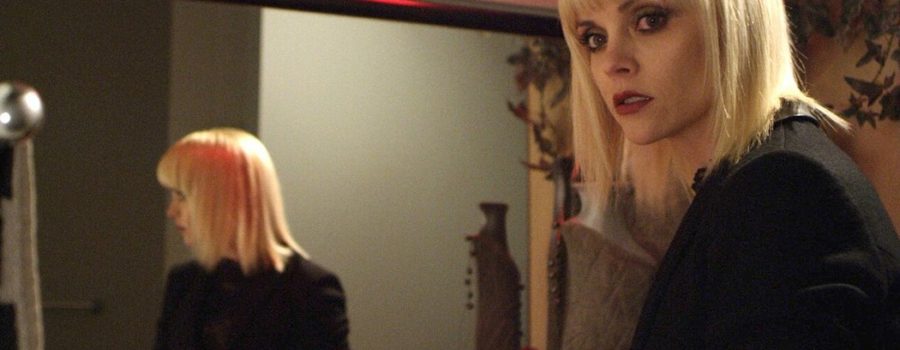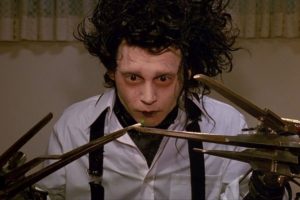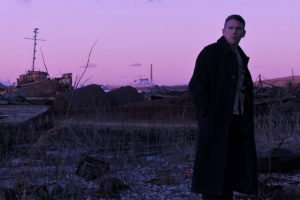[Published at Film Inquiry] In director Rob W. King‘s Distorted, Christina Ricci plays a bipolar artist, Lauren, who believes her new apartment complex is subliminally brainwashing its residents. Like most characters who suffer from persecutory delusions of grandeur in these kinds of films, nobody believes her conspiracy theory. Instead of a creepy old house, the central couple, Lauren and Russell (Brendan Fletcher) move into a modern, remote, safe apartment complex with CCTV (a closed-circuit television system) and heavy security, called a “smart building.”
The antiquated woman-turns-crazy-in-a-strange-house trope is quite exhausted, and, unfortunately, Arne Olsen‘s script brings nothing new to the sub-genre besides a new setting. In fact, even in a film with John Cusack in a supporting, albeit underutilized role, Ricci‘s performance is, far and away, the best thing about Distorted.
Still, Distorted‘s editing, cinematography, and score feel like something made for a Lifetime thriller rather than the components of a film starring two A-list stars. Some viewers may want to forgo this apartment complex’s strange happenings for some more genuine thrills elsewhere. However, others may find Distorted a perfectly watchable late-night thriller.
Mental Illness Or Brainwashing?
The entirety of Distorted revolves around one question that Olsen inherently raises: are the auditory and visual hallucinations that Lauren are experiencing a part of her current illness and perhaps a type of schizophrenia as well, or are they actually a part of a brainwashing experiment? Cinematographer Mark Dobrescu makes many of these hallucinations look minimally menacing and rarely realistic. Lauren begins doing research; subliminal advertising progresses to subliminal messages to more complex theories as she opens up several rabbit holes. As the hallucinations continue, Lauren’s psychiatrist prescribes her a higher dosage of her medication, calling it a “minor setback.”

source: Minds Eye International
Some of the brainwashing sequences, displayed via the television or implied inside Lauren’s mind, and the dream sequences edited by Jackie Dzuba, are constructed in a slapdash fashion, and Olsen‘s script is predictable and, for lack of a better word, silly. Furthermore, it is a bit problematic that the script makes something gimmicky out of mental illness.
Cusack‘s conspiracy theorist, emo tech guy archetype isn’t introduced until more than halfway into Distorted. He explains to Lauren that there are many ways to bypass the regular filtering methods and implant information directly into the brain such as ultrasonic, infrasonics, and pulsed electromagnetic fields, like mind control, developed by defense departments and medical research companies. Whether or not that is happening to Lauren remains to be seen.
Ricci & Cusack Work With What They Have
Ricci is one of the few actors to have withstood childhood stardom and who has maintained acting prestige into her adulthood. Never one to shy away from daring roles, Ricci has starred in such films as Buffalo ’66 and Prozac Nation; she is no stranger to portraying mental illness realistically. In the role of Lauren, she doesn’t over-exaggerate the symptoms of her condition, and, as always, she’s convincingly naturalistic, even when given stale dialogue. Even when the script turns from trite to ridiculous, Ricci remains the glue that keeps Distorted from falling apart.

source: Minds Eye International
Cusack, though he began acting at a slightly later age than Ricci did, is also another actor to have braved teenage stardom, and one who continues to get consistent, leading roles, decades after his “glory days.” In Distorted, however, Cusack is only on screen for about a maximum of no more than 10 or 15 minutes. Unfortunately, as such, the film is a waste of his talents as an actor. His aforementioned emo tech character archetype is considerably overdone, too. He’s an investigative journalist, yet, like most characters operating under the radar, he wears a black hoodie and/or baseball cap. Of course.
What Works?
King‘s direction is assured and technically skilled. Some of his shots are clearly inspired by some of the greats before him, including many slow, low-perspective hallway dolly shots a la Stanley Kubrick‘s The Shining. The quality of his direction is lowered, however, by his and Dzuba‘s choice of brainwashing sequences. The setting provides some impressive views for pans and shots. The concept of the “smart building” is interesting, and Kathy McCoy‘s production design not only sells the idea, but makes it tangible. Some of the exterior shots of the building are poorly digitalized, but the interior is clearly thoroughly and thoughtfully put together.

source: Minds Eye International
In the current wave of the new technological innovation of virtual reality (VR), Distorted is one of the few films to release a separate, VR film experience, called Distorted Reality. Only 10 minutes long, it would be intriguing to see that film. The trailer provides a hint of the 360-degree VR experience. Apparently, the VR portion was filmed immediately after the King‘s live-action portion for consistency. Then, the actors would film another VR portion with dialogue. It is an impressive feat to accomplish, considering the size of the crew of a film of this scope; many of the crew members had to hide behind buildings and walls for the VR shots to avoid being in the film.
Distorted: Wasteful In Many Ways
It would be great to see Ricci and Cusack together in a movie that provides them with substantive roles. Distortedis not that movie. Though they are typically strong, considering the material they are given, their onscreen presence isn’t enough to elevate the story. It is not an unwatchable film, by any means, but it is one with too many problems to ignore, and certain post-production components lower its quality. King does more with Olsen‘s script than many filmmakers likely could, but without a sharp script, it usually doesn’t seem to matter how good any other aspect of a film is.
Distorted leaves viewers with a disjointed, unoriginal story, a made-for-TV feel, and underwhelming thrills, with the only saving graces being the presence of Ricci and Cusack.
Do you enjoy psychological thrillers? Films about mental illness? Favorite Ricci performance? Cusack performance?
Distorted opened in the U.S. theatrically and on VOD on June 22, 2018. For more information on its release, click here.
Opinions expressed in our articles are those of the authors and not of the Film Inquiry magazine.








Leave a Reply
Your email is safe with us.